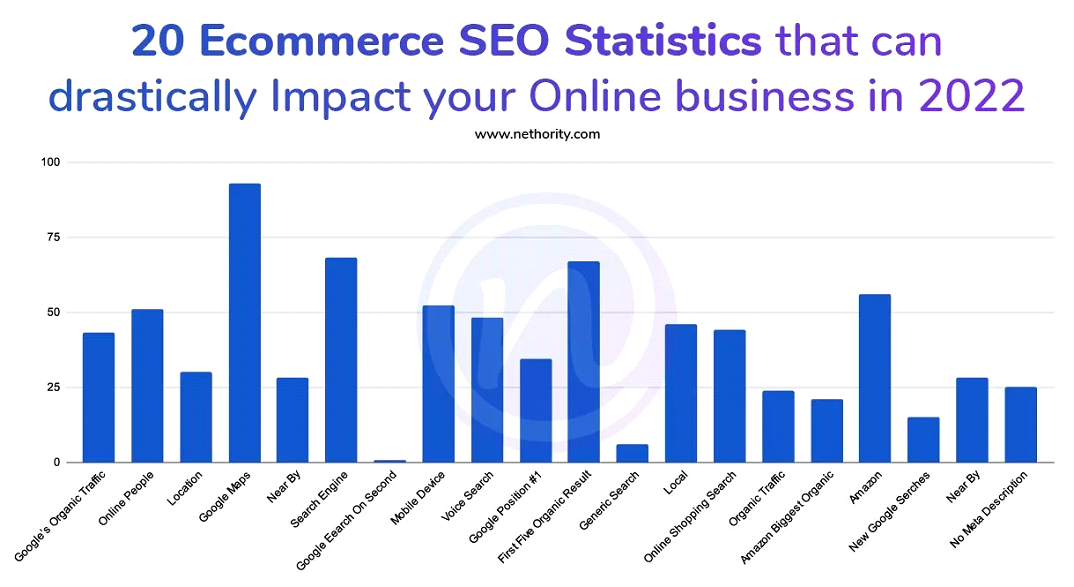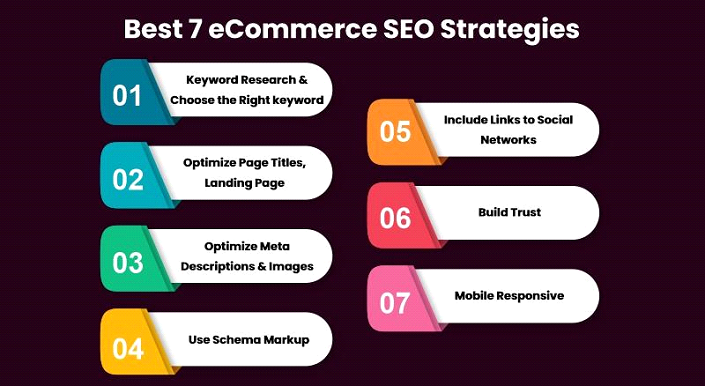
SEO for E-commerce Website: 7 Best E-commerce SEO Strategies

Do you own an e-commerce store? Do you still have a website without SEO? Want to get more traffic and orders? Then you should try SEO for an eCommerce website.
What exactly is SEO?
SEO stands for Search Engine Optimization and basically means giving search engines what they want. If you want visitors to your site, you need to provide them with what they need to see your website.
There are two types of SEO: On-Page and Off-page. On-page means optimizing the content on your website. Off-page refers to optimizing keywords and links on your site. Both play an important role in giving visibility to your products and services. In order to get the best returns, it's always recommended to use both. You can also use eCommerce SEO strategies to improve your website ranking and drive more traffic.
What is SEO in E-commerce?
SEO (Search Engine Optimization) is critical for any business to succeed online. Ecommerce SEO is a free way of getting more traffic to your website and making it more visible on the search engine results pages (SERPs). It’s basically the same concept as SEO, where you’re trying to drive more traffic to your site, and get more people to buy products online.
For your web pages to rank higher in SERPs, you need to ensure your website is optimized for search engines - from the keywords to use, to the technical setup of your website, and whether your website is mobile responsive all have a huge impact on SEO optimization.
Ecommerce SEO is a great way to increase sales and improve customer retention. Once you have started generating revenue, Ecommerce SEO Agency becomes even more critical. Customers expect their purchases to arrive quickly. If you don’t provide the best service possible, they won’t return. A good SEO strategy for an eCommerce website can help ensure customers love your brand and become repeat buyers.
Why Does SEO Matter for eCommerce Sites?
SEO is a critical necessity and matters the most for e-commerce websites. SEO helps increase traffic by ranking highly in search engine results, which means people find them easily online. Your website and products should rank higher than your competitors if you want to succeed. Many people think that SEO is just about writing good content and getting links back to your site - while these things do play a role, there’s actually a lot more involved!
Also Read:- Latest SEO Trends For Ecommerce In 2022
What is the Importance of SEO in an E-commerce Website?
- Increase the visibility of the website
- Increase website traffic
- Enhances user's trust on the website
- Leads to better customer experience
- Leads to higher conversions

There are many eCommerce platforms that offer great features on their websites. However, if they don’t have proper eCommerce SEO strategies implemented, then their businesses might not be getting the traffic needed to achieve their goals.
First, let's understand the simple process of how your business can appear in SERP (Search Engine Result Page)
It is pretty simple, actually; they want to get information about products, services, etc. But how do you make sure that people know about your business when they type something into Google? You tell the search engine spiders (the little robots who crawl around the web looking for content) where to go. These bots look at your website and determine whether it contains relevant keywords to the topics that users are searching for. That's what good SEO does, it makes sure that people searching for products or services find your website first. Sounds easy right? Well, it isn't. There are thousands of different factors that go into making sure your website gets the attention it deserves. Here are some SEO tips for eCommerce websites to help you out.
E-commerce SEO Checklist: Best 7 eCommerce SEO Strategies To Improve Traffic & Ranking

As an eCommerce owner, are you worried about “how to improve eCommerce SEO?”. Here is the list of marketing strategies for eCommerce business to get a better ROI score, let's dig in.
1) Keyword Research & Choose the Right Keyword
Do you know, that 43% OF E-COMMERCE TRAFFIC COMES FROM ORGANIC GOOGLE SEARCH?
Keywords play a key role in SEO. If you want people to find your products online, then you need to focus on ranking high on Google search results. Search engines rank websites based on how relevant the keywords are to the content of the page. To do this, you need to figure out what keywords drive traffic to your site and what words aren't being searched for at all.
Once you know this information, you can start including those terms in your content and meta description. When writing the text for pages, try to keep the keyword density low. Too much emphasis should not be placed on individual keywords. Instead, think about how well-written sentences and paragraphs flow together.
It is always a good idea to choose the right keywords for your product. You might end up with many visitors, but if they do not find what they are looking for, then it's useless. So before putting your keywords, make sure that your audience is actually searching for them.
There are a few different types of keywords: short-tail and long-tail.
- A short-tail (head term) keyword contains 1-3 words
- A long-tail keyword contains 3-5 words
Long tail keywords are a good SEO tactic to get targeted traffic from the search engines and easy to convert leads. Short-tail keywords have higher search volume and more competitive.

Here are some best free and paid keyword research tools:
- Ubersuggest
- SEMrush
- Ahrefs Keyword Explorer
- Google Keyword Planner
- Keyword Tool
Also, you can find the more related keywords (keyword predictions) from Google search’s autosuggestion (Google Autocomplete) and at the bottom of Google’s search results.

2) Optimize Page Titles, Landing Page, and Product Description
The product description is the first thing you should optimize on your eCommerce store. It shows how much attention you paid to your products and what kind of quality they have. You can start with writing short sentences about the features of each product instead of trying to make them long paragraphs.
Below are some tips for writing product descriptions and making them well optimized:
- Focused on the target audience.
- Use the main keyword 2-3 times and LSI keywords without stuffing.
- Write the description based on competitor analysis and make the unique description nearly 1000+ words on the product type.
- Write the description for your customers and bot both.
- Highlight your product's main features and details.
Page title tags are often overlooked when it comes to SEO. Make sure that the first few characters of each sentence match the keywords on your page. Use descriptive words whenever possible. In addition, try to avoid using hyphens - especially after numbers. Keep track of the keywords you're using in the URL. These keywords help with navigation and encourage users to click back over and over again.
A landing page is a single page that appears first after someone clicks on your ads. You can use landing pages effectively to increase conversions. Landing pages can feature different CTAs to direct visitors to specific parts of your website. For example, you can create a CTA for lead magnets, another for blog posts, and another for sales pages. Make sure to include calls to action that match the CTAs you created in the previous step. And lastly, make sure your landing page offers value to users.
3) Optimize Meta Descriptions, Titles and Images
The meta title and description give a brief overview to users and search engines of what the web page is about. Meta Descriptions appear below the title tag on the search results page. The goal of a meta description is to give potential customers a quick overview of what's on the page. Meta Descriptions are therefore an excellent way to encourage customers to stay on your site longer. A meta title is an important part of the website optimization and read by search engine robots.

- The ideal length of meta description is 160-165 characters maximum.
- The length of meta title is 50–60 characters.
One of the best ways to increase the ranking of products on your ecommerce website is to optimize images. A well-optimized image will provide a high-quality product shot at eye level and will show the product close enough to entice people to click on it.
4) Use Schema Markup
Schema markup helps search engines determine the intent behind a web page. Schema markup is a standard way for web crawlers to understand how to index certain information (like categories). If you'd rather have your own business rank higher than competitors, then you'll need to use schema markup. Search engines look at these codes differently than HTML codes, and if you add them correctly, they can boost your site's ranking. By making use of schema markup, you'll get higher rankings on Search Engines.
5) Include Links to Social Networks
Social media is important to ecommerce businesses. Not only do social shares help drive traffic back to a webpage, but it also helps create brand awareness. However, social posts are quite time-consuming, so it pays to hire someone who understands the nuances of the platform. Social media sites like Facebook, Instagram, Twitter, and Pinterest offer free advertising opportunities. By adding a social share button, you can increase your chances of getting people talking about you.
6) Build Trust
Trust is a factor most digital marketers overlook while building online marketing strategies. Many consumers turn to review websites before making purchases. If you have negative reviews, consider doing some customer service. Explain the situation, apologize profusely if necessary, and fix the problem. Positive feedback is even better. Asking for positive reviews is a great way to build trust.
Customers always prefer buying from trusted brands because they know those brands will deliver high-quality products. In addition, consumers enjoy shopping from stores where they feel comfortable and safe. Your business can build trust with its customers by providing them.
7) Mobile Responsive
Mobile traffic makes up over 50 percent of total web traffic today. To get the maximum benefit out of mobile marketing, make sure to design and develop your site using responsive web design. If your customers are browsing the internet on mobile devices, then your website should be optimized for that. Don't assume that everyone has a desktop computer anymore. Even though the majority of web surfers have desktops, not everyone is accessing the Internet via a laptop or PC. A lot of people access the web through smartphones or tablets. Make sure that your website looks good on these different screen sizes. A responsive website adapts itself automatically depending on the size of the screen, it is viewed from. The best part is, that responsive websites work perfectly well, even if it’s smartphones or tablets.
Also Read:- The Ultimate Guide On Mobile Commerce
Conclusion: The Power of SEO in Ecommerce
Surprised to know how SEO impacts e-commerce websites? SEO for eCommerce Websites is not a single thing. You cannot just have “SEO”. These days, people use Google to find almost anything. A keyword-based search engine is what they use to find information, products, services, etc. And if you want to get your product or service seen by them, then it is very much necessary to optimize your website to maximize its potential. We have talked about some of the best eCommerce marketing strategies that can be implemented to make sure that your website does well in the rankings.
It is essential to plan and implement some great eCommerce marketing strategy in 2022 for better performance, to boost the website’s organic traffic, and to appear among the top ranking websites on Google search. If you want to find the best eCommerce SEO packages, get in touch with us at MageAnts today.
